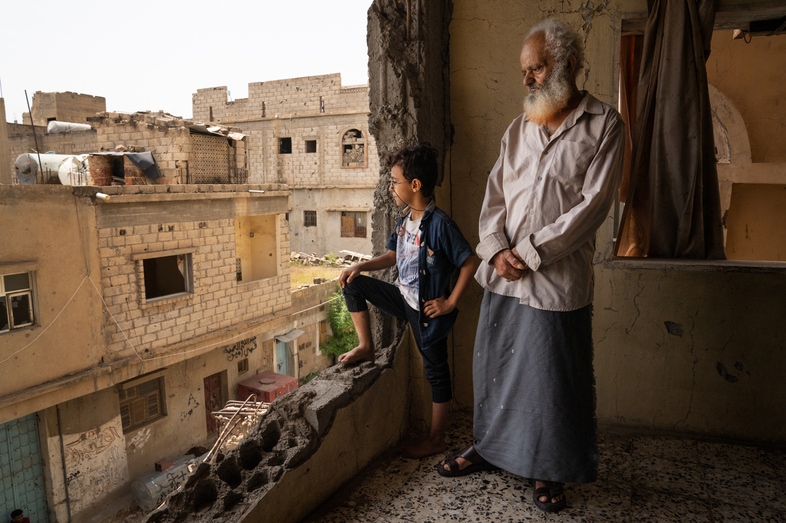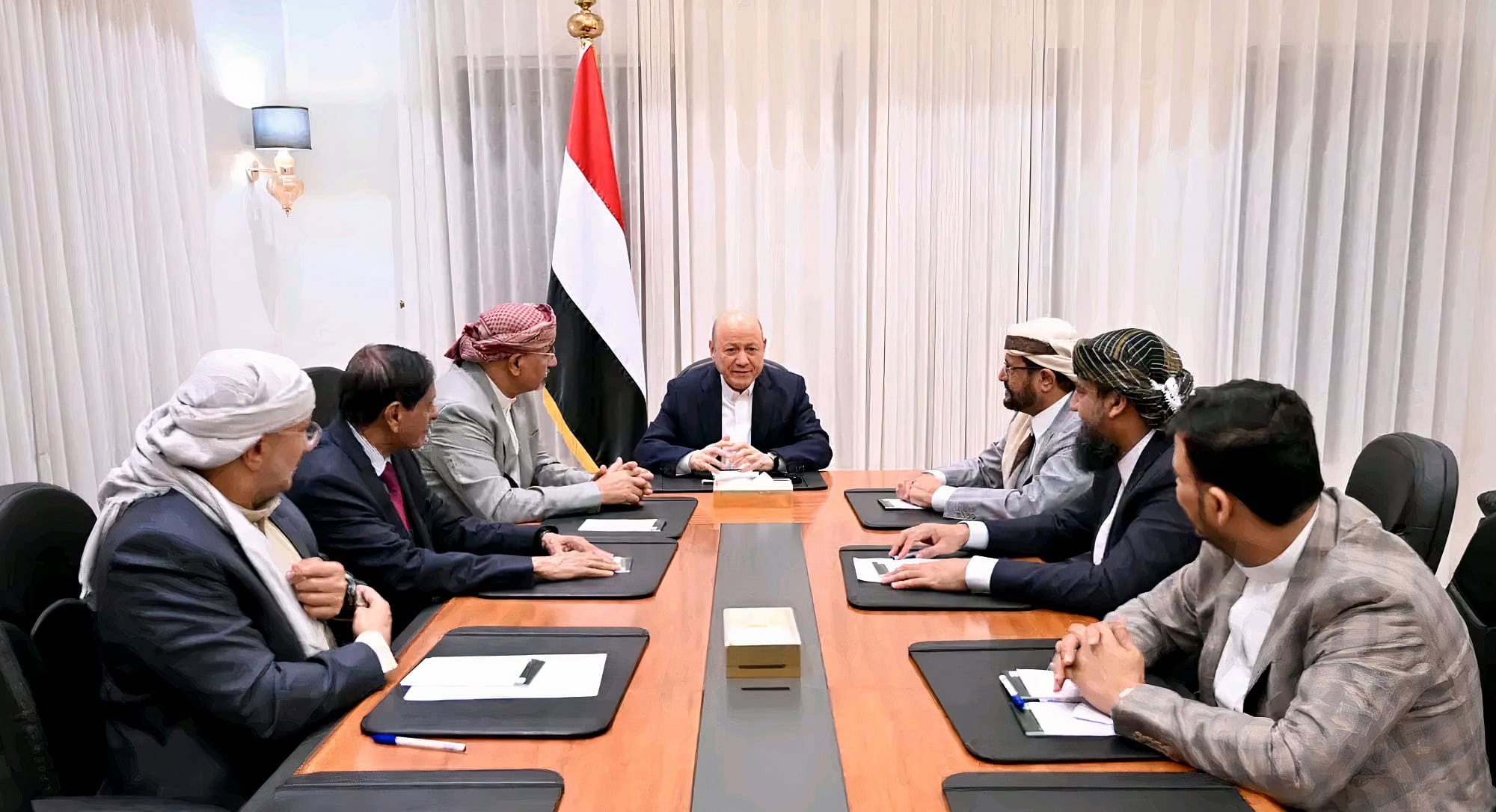
Claire Harbage/NPR
آخر تحديث في: 04-10-2023 الساعة 10 صباحاً بتوقيت عدن
Legitimacy in the contemporary Yemen has not found solid ground since the Yemenis revolted against their traditional governing systems in the 1960s (the Imamate in North and the Sultanates in South). Since then, Yemeni politicians have been striving to establish legitimacy for their rule, but politics often swiftly transforms into military conflict, leading to explosive situations. The recent civil war is not a departure from this pattern but a confirmation of it.
Basam S. Dahy (South24)
Escaping from the ‘Republic's Legitimacy’ to ‘Unity's Legitimacy’
The news of the war in Yemen has echoed throughout the world, and a prevalent perception, especially among Western commentators, is that the reasons behind the conflict in Yemen are the interventions of its neighbors, framed as a regional conflict between the two shores of the Arabian Gulf. The reality, however, is that Yemenis, through their conflicts, are the ones summoning external involvement, and it is not the external forces inciting them to fight. Yemenis have ample reasons to engage in what they have mastered above all else. War and the politics of war have penetrated and permeated every facet of life in Yemen, becoming a black hole that swamps not only Yemenis but also the entire region.
The root of the problem lies primarily within Yemen, and external intervention in Yemen is not alluring but, if it occurs, it is closer to settling scores and testing influence among external powers in a land that is ideal to serve as a battleground. The issue in contemporary Yemen can be traced back to the fact that legitimacy and the legitimacy of governance have not been on solid ground since Yemenis rebelled against their traditional governance systems in the 1960s (the Imamate in North and the Sultanates in South). Yemeni politicians have been seeking to establish legitimacy for their rule ever since; but what begins as a political matter often swiftly turns into a military one, causing explosions of conflict and leading legitimacy to drift in search of a new foundation.
The recent war is not a departure from this pattern but rather a confirmation of it. It drains both people and the land itself, and it exhausts the warring parties. After a while, we realize that we are merely facing a temporary truce, which may either extend or shorten, but nothing more, and so the cycle continues.
The legitimacy in contemporary Yemen was founded on the legitimacy of the republican system in the 1960s, and it was a violent and bloody transformation. However, the fates of governance legitimacy in contemporary Yemen differed relatively between the two states: the People's Democratic Republic in South (independent from British rule in 1967) and the Yemen Arab Republic in North (established in 1962). The People’s Democratic Republic in South managed to establish a more robust and solid legitimacy compared to the Yemen Arab Republic in North, which had a somewhat reconciliatory relationship with the tribal structure of the Imamate, or the former legitimacy. This relative contrast in stability came at a greater human and economic cost in South, as the Southern system adopted a socialist approach, specifically the Soviet model of socialism, which emphasized the dictatorship of the proletariat and one-party rule.
We did not witness a serious revival of the legitimacy of the Sultanates in South, while we saw re-emergence of the legitimacy of the Imamate in North, particularly in the remote Northern regions. In both states, in North and South, the solidity of governance legitimacy was periodically tested, often violently. The fates of five republican presidents ended in assassination, and a series of wars erupted between North and South, suggesting that the "republic’s legitimacy" was insufficient, and the path seemed paved, or so the politicians believed, for a new version of legitimacy: "unity’s legitimacy”, meaning the unity between North and South.
Exhaustion had overwhelmed both states in the late 1980s, economically in North and both economically and politically in South after the violent events within the ruling Yemeni Socialist Party in January 1986. They entered into unity in May 1990 as an escape and hope. The Southerners realized that "unity’s legitimacy" was a loose-fitting garment that made them a minority in the densely populated North. Meanwhile, the Northerners realized that "unity’s legitimacy" solved their legitimacy issue and strengthened its initially weak foundation. The Northerners collaborated with the Islamists, and in the summer of 1994, they invaded South to establish a legitimacy based on unity while at the same time nullifying the legitimacy of their true partner in this unity, which was South.
This imbalance sowed the seeds of a new legitimacy in South, fought for under the banner of independence from "unity’s legitimacy”, which grew and expanded, becoming the Southern Transitional Council (STC) in 2017.
On the other hand, "unity’s legitimacy”, led by the former president Ali Abdullah Saleh for over two decades before he met his end through assassination at the hands of the heirs of the Imamate project (the Houthis), opened the door to a partial abandonment of the "republic’s legitimacy”. This gap created an opportunity for Islamist groups (such as the Islah Party and Islamic factions) to promote their concepts and ideologies about the unity of the Muslim nation, the Islamic caliphate, and the lack of belief in the legitimacy of the nation-state, among other ideas. Discussions about "republic’s legitimacy" became less prominent, so we witnessed boldness in openly discussing what we thought had died: "Imamate’s legitimacy”, championed by the Believing Youth group, which would later transform into the Houthi movement (Ansar Allah).
Some may argue that the state in Sanaa waged six wars against the Houthis, which is true, but it did not fight in the name of the republic. Reliance on the "republic’s legitimacy" had diminished significantly at that time, and diminished completely when the deep state in Sanaa allied with the Houthis in a historic moment in the summer of 2014, leading to the Houthi takeover of the capital. In essence, "republic’s legitimacy" aligned itself with its rival, the standard enemy: "Imamate’s legitimacy”. This marked the beginning of a new wave of wars of legitimacies in Yemen.
The Wars of Legitimacies: Gains and Losses
Ansar Allah (the Houthi group), carrying the banner of "Imamate’s Legitimacy", initiated this war under the illusion of taking control of the entire country and replacing the diminishing "Republic’s Legitimacy". However, the Houthi group succeeded only in gaining control over its tribal, social, and religious sectarian influence areas in North. Assessing the gains, it is clear that the Houthi group succeeded in removing the former legitimate president, Abd-Rabbu Mansour Hadi, from Sanaa and imposing its rule, as well as escaping punishment for its unlawful actions in overthrowing him in September 2014. Now, it seeks international recognition! Some of the mentioned gains were also acquired, albeit to a lesser extent, by the remnants of the former President Ali Abdullah Saleh's regime (General People's Congress - Sanaa), who found themselves in a forced alliance with the Houthi group in order to distance themselves temporarily from the fate of their former leader. While the General People's Congress party solidified its presence in Sanaa in partnership with the Houthi group, it also secured a position on the other side: the PLC, the heir to the legitimacy of former President Abd-Rabbu Mansour Hadi. This makes it the only Yemeni political component with a panoramic view of what has transpired, as it is involved with both sides.
The loss of the General People's Congress party in this war lies in its division as a seasoned political party in governance and politics, and perhaps this could give it an opportunity to unify its ranks and revitalize its activities in North instead of dispersing its strength, in the absence of a political structure for the Houthi group.
On the other side directly stands the PLC - “AlShar’iyya”, or the legitimacy that derives its name from its inheritance and continuation, bearing the heavy legacy of the former president of unified Yemen, Abd-Rabbu Mansour Hadi. This side lost the capital, Sanaa, and from the beginning, its components have shown that they are not in agreement, and what unites the various factions is the fight against the Houthi group. This has become evident in the state of imbalance in security and services in the "liberated" areas, especially in the temporary capital of PLC, Aden. This team possesses the strong card of "Constitution’s legitimacy”, which has brought its components together reluctantly, including the (General People's Congress - PLC) party, the Islamists (Islah party), and the Southerners (STC), which are components with opposing goals in their political work and differing views on the concept of legitimacy. The primary gain for this side in the last war has been the control over approximately two-thirds of the country and preventing the Houthi project from ruling the entire country. Additionally, this side has established significant international relations during the war and promoted itself regionally and globally, something that the Houthis has not achieved.
As time goes on, the contradictions between the components of the political parties will intensify, and all components will be forced to reassess their positions according to their own understanding of the concept of legitimacy in governance. This will put "legitimacy" in a state of fluidity, shaped by the conflict of competing political powers, as usual. The alliance between the Houthi group and the Congress party (General People's Congress - Sanaa) will be the first to face instability, division, and even armed conflict, as differences often culminate in armed struggles in contemporary Yemen, with no mechanism in place to manage these differences, making this possibility more likely.
It is highly likely that the two sides in the General People's Congress party (Sanaa and PLC) will reunite against the Houthi group; and the military confrontation with the Houthi group will revolve around renewed old legitimacies: "Republic’s Legitimacy" in opposition to "Imamate’s Legitimacy”, as had happened in the 1960s.
As for the Islamists, the Islah party, its loss is significant. Firstly, it lost half of its power in Sanaa after rebelling against its partner in governance, former President Ali Abdullah Saleh, in 2011. Then, it lost the other half in 2014 after the Houthi group's occupation of Sanaa; and it lost its wide influence within legitimacy after replacing the former president, Abd-Rabbu Mansour Hadi, with a PLC that includes three senior officials from the STC, who are its opponents in South. The Islah party will continue to position itself under "unity’s legitimacy”, allowing it to operate extensively. During the war period, it leaned more towards emphasizing the "unity" aspect of legitimacy, which led to clashes with the STC in South.
As for the STC, one of the biggest winners in the recent war, it will continue to establish its own legitimacy and pursue its campaign to consolidate its influence in South, enhance demands for independence, regain its state, and combat the terrorist groups that spread after the occupation of the Southern lands by the alliance of the General People's Congress/Islah party in 1994. It's worth noting that the focus on combating terrorist groups will make the STC gain the trust of the region and the international community, especially given the absence of an international role in counterterrorism in the southern Arabian Peninsula and the international maritime passages.
Postdoctoral researcher at the New York University in Abu Dhabi, and writer and author.
(The opinions expressed in this article reflect the views of its author)

قبل 3 أشهر